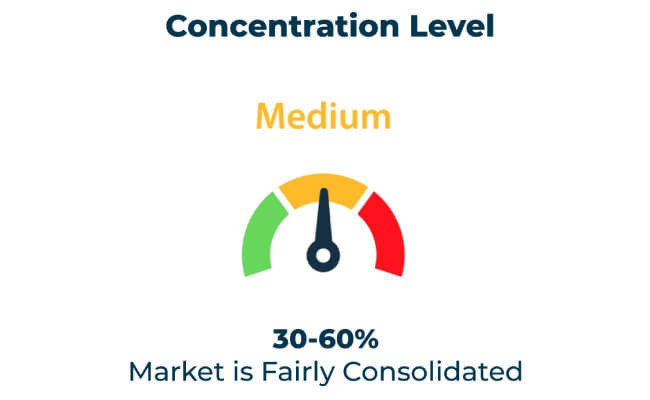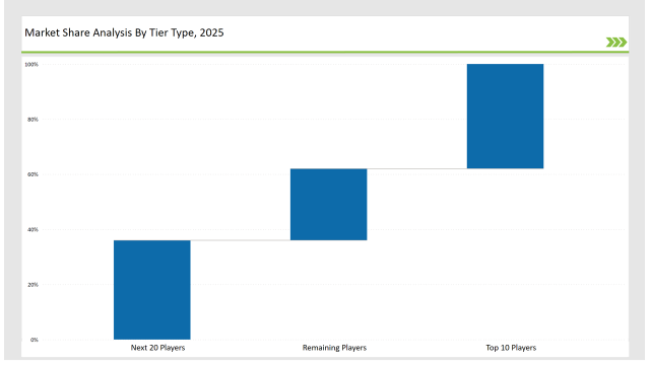The wine bag market is experiencing a remarkable growth with increasing demand for sustainable, premium, and good-looking packaging solutions. Brands are targeting biodegradable, reusable, and insulated wine bags to meet changing consumer needs and green regulations. Innovation in materials like jute, kraft paper, and recycled plastics is dictating the way of the industry.
Businesses are incorporating smart packaging components, such as QR codes for authenticity, temperature indicator labels, and NFC smart tags for a more consumer-friendly experience. E-commerce, luxury gift-giving, and wine travel are also creating demand for quality and custom-branded wine bags that provide functionality and brand differentiation.
Tier 1 players like WestRock, Smurfit Kappa, and Amcor occupy 38% of the market share, driven by their well-established distribution channels, sustainable packaging knowledge, and innovative product engineering.
Tier 2 players like Berry Global, Mondi Group, and Sealed Air enjoy 36% of the market share, specializing in high-performance, long-lasting, and insulated wine bags for retail, logistics, and luxury packaging solutions.
Tier 3 comprises local and niche players that are experts in environmentally friendly, artisanal, and custom-printed wine bags with a combined market share of 26%. These players focus on small-batch production, customization, and green alternatives.
Global Market Share by Key Players (2025)
| Category | Market Share (%) |
|---|---|
| Top 3 (WestRock, Smurfit Kappa, Amcor) | 19% |
| Rest of Top 5 (Berry Global, Mondi Group) | 12% |
| Next 5 of Top 10 (Sealed Air, Uline, DS Smith, PaperPak, Wine Enthusiast) | 7% |

The wine bag industry serves multiple sectors, emphasizing sustainability, durability, and branding. Companies develop innovative solutions to meet premium, eco-friendly, and functional packaging needs. They enhance bag designs with advanced insulation for temperature control. Businesses integrate smart packaging features to provide interactive consumer experiences.
Manufacturers refine wine bag designs with durability, sustainability, and branding enhancements. They incorporate AI-driven personalization, smart packaging, and premium materials for differentiation. They integrate advanced printing techniques to enhance visual appeal. Companies use reinforced stitching and ergonomic handles for improved durability. Businesses optimize material sourcing to ensure eco-friendliness and cost efficiency.
Automation and sustainability are transforming the wine bag market. Companies introduce eco-friendly wine carriers, temperature-sensitive packaging, and RFID-enabled authentication solutions. Businesses leverage AI-powered customization, offering tailored designs for high-end clients and wine brands. Manufacturers adopt bio-based polymers and minimalist luxury packaging to cater to premium consumer demands. They develop smart wine bags with NFC authentication for enhanced customer engagement. Firms expand the use of temperature-sensitive materials to preserve wine quality during storage and transport. Industry leaders invest in AI-driven personalization to create unique, branded experiences. Companies refine their supply chains to integrate high-barrier, eco-friendly coatings that improve durability and recyclability.
Year-on-Year Leaders
Technology suppliers should emphasize sustainability, premium design elements, and smart packaging innovations to capitalize on the evolving wine bag market. Partnering with luxury wineries, e-commerce brands, and hospitality sectors will accelerate market penetration and differentiation.
| Tier Type | Example of Key Players |
|---|---|
| Tier 1 | WestRock, Smurfit Kappa, Amcor |
| Tier 2 | Berry Global, Mondi Group, Sealed Air |
| Tier 3 | Uline, DS Smith, PaperPak, Wine Enthusiast |

Leading manufacturers advance wine bag sustainability, branding, and protective capabilities. Companies integrate high-end foil stamping, biodegradable materials, and smart authentication technologies to enhance user engagement and comply with global sustainability mandates. They implement tamper-proof closures to ensure product security.
| Manufacturer | Latest Developments |
|---|---|
| WestRock | Launched FSC-certified reusable wine bags in April 2024. |
| Smurfit Kappa | Developed lightweight kraft paper wine carriers in May 2024. |
| Amcor | Introduced temperature-sensitive wine packaging in June 2024. |
| Berry Global | Released insulated wine bags with tracking sensors in July 2024. |
| Mondi Group | Strengthened premium gifting wine bags with foil embossing in August 2024. |
| Sealed Air | Innovated shock-absorbent padded wine bags in September 2024. |
| Wine Enthusiast | Unveiled interactive QR-enabled wine gift bags in October 2024. |
The wine bag industry is evolving as companies invest in eco-conscious materials, luxury packaging, and interactive branding solutions. Manufacturers are optimizing AI-powered personalization, blockchain authentication, and bio-based polymers to enhance sustainability and exclusivity. Additionally, companies are integrating temperature-sensitive tracking and premium recyclable alternatives to align with evolving market demands.
Manufacturers will continue to develop AI-driven customization, biodegradable wine carriers, and smart authentication packaging. Companies will expand blockchain-based traceability, luxury finishes, and interactive digital experiences. Additionally, ultra-lightweight, durable, and compostable materials will become the industry standard, aligning with global sustainability commitments. They will enhance real-time tracking features to ensure product authenticity. Firms will integrate temperature-sensitive materials to preserve wine quality during transit. Industry leaders will invest in smart labeling solutions that provide customers with detailed origin and sustainability information. Businesses will also expand the use of high-barrier, eco-friendly coatings to improve packaging durability while maintaining recyclability.
Leading players include WestRock, Smurfit Kappa, Amcor, Berry Global, Mondi Group, Sealed Air, and Wine Enthusiast.
The top 3 players collectively hold 19% of the global market.
The market shows medium concentration, with top players holding 38% of the industry share.
Eco-friendly materials, luxury branding, AI-driven personalization, and blockchain authentication.






Our Research Products

The "Full Research Suite" delivers actionable market intel, deep dives on markets or technologies, so clients act faster, cut risk, and unlock growth.

The Leaderboard benchmarks and ranks top vendors, classifying them as Established Leaders, Leading Challengers, or Disruptors & Challengers.

Locates where complements amplify value and substitutes erode it, forecasting net impact by horizon

We deliver granular, decision-grade intel: market sizing, 5-year forecasts, pricing, adoption, usage, revenue, and operational KPIs—plus competitor tracking, regulation, and value chains—across 60 countries broadly.

Spot the shifts before they hit your P&L. We track inflection points, adoption curves, pricing moves, and ecosystem plays to show where demand is heading, why it is changing, and what to do next across high-growth markets and disruptive tech

Real-time reads of user behavior. We track shifting priorities, perceptions of today’s and next-gen services, and provider experience, then pace how fast tech moves from trial to adoption, blending buyer, consumer, and channel inputs with social signals (#WhySwitch, #UX).

Partner with our analyst team to build a custom report designed around your business priorities. From analysing market trends to assessing competitors or crafting bespoke datasets, we tailor insights to your needs.
Supplier Intelligence
Discovery & Profiling
Capacity & Footprint
Performance & Risk
Compliance & Governance
Commercial Readiness
Who Supplies Whom
Scorecards & Shortlists
Playbooks & Docs
Category Intelligence
Definition & Scope
Demand & Use Cases
Cost Drivers
Market Structure
Supply Chain Map
Trade & Policy
Operating Norms
Deliverables
Buyer Intelligence
Account Basics
Spend & Scope
Procurement Model
Vendor Requirements
Terms & Policies
Entry Strategy
Pain Points & Triggers
Outputs
Pricing Analysis
Benchmarks
Trends
Should-Cost
Indexation
Landed Cost
Commercial Terms
Deliverables
Brand Analysis
Positioning & Value Prop
Share & Presence
Customer Evidence
Go-to-Market
Digital & Reputation
Compliance & Trust
KPIs & Gaps
Outputs
Full Research Suite comprises of:
Market outlook & trends analysis
Interviews & case studies
Strategic recommendations
Vendor profiles & capabilities analysis
5-year forecasts
8 regions and 60+ country-level data splits
Market segment data splits
12 months of continuous data updates
DELIVERED AS:
PDF EXCEL ONLINE
Industry Share Analysis for Reusable Wine Bags Companies
Wine Bag Market Forecast and Outlook 2025 to 2035
Competitive Overview of Wine Box Companies
Market Share Breakdown of the IV Bag Market
Market Share Breakdown of Bag-In-Box Manufacturers
Competitive Landscape of Bag-in-Tube Market Share
Market Share Breakdown of Wine Tourism Manufacturers
Assessing Tote Bag Market Share & Industry Trends
Understanding Market Share Trends in Mesh Bags
Competitive Landscape of Oven Bag Providers
Market Share Insights for Bagasse Bowls Providers
Competitive Breakdown of Silo Bag Manufacturers
Market Share Distribution Among Garbage Bag Companies
Reusable Wine Bags Market Size and Share Forecast Outlook 2025 to 2035
Market Share Insights of Bagging Machine Providers
Trash Bag Market Leaders & Competitive Insights
Market Share Breakdown of Craft Bags Manufacturers
Competitive Breakdown of Paper Bags Providers
Market Share Analysis of Jumbo Bags & Key Players
Understanding Market Share Trends in Bagasse Packaging

Thank you!
You will receive an email from our Business Development Manager. Please be sure to check your SPAM/JUNK folder too.
Chat With
MaRIA